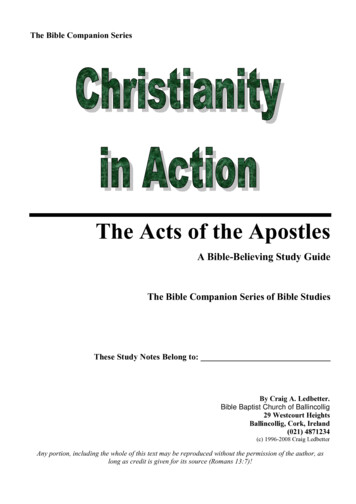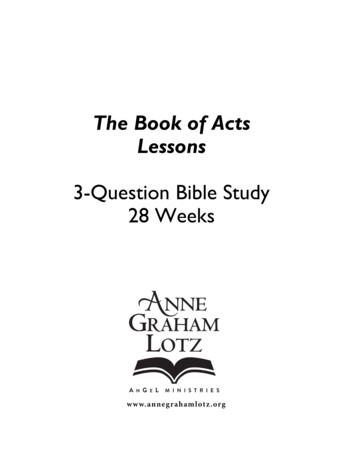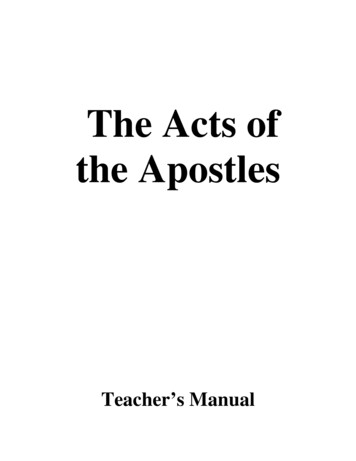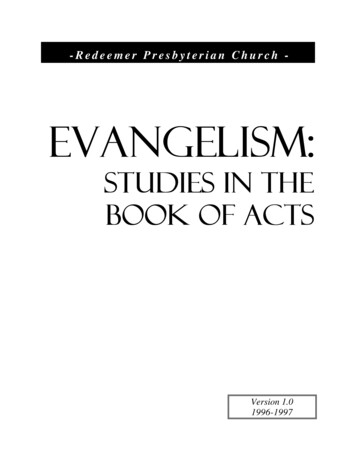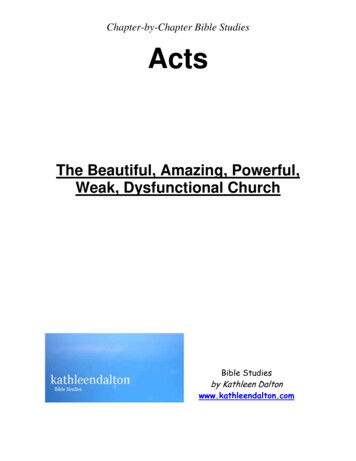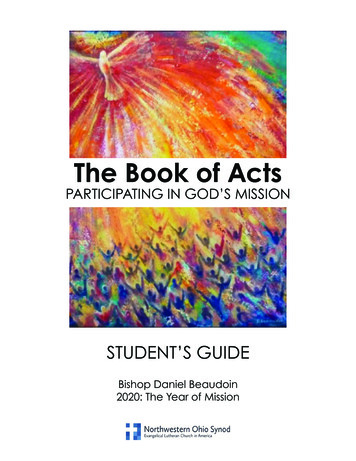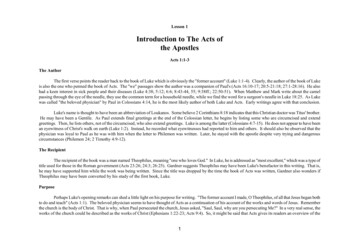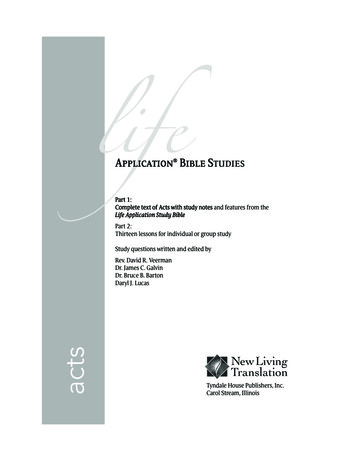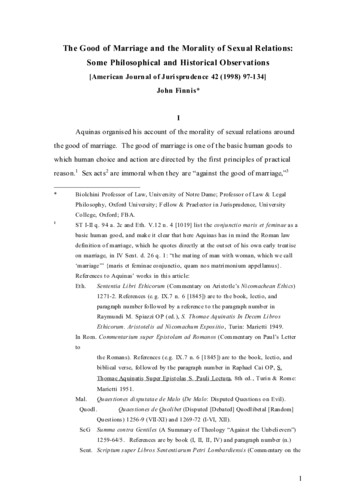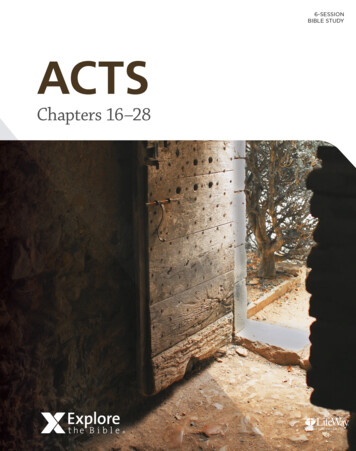
Transcription
ACTSChapters 16–28LifeWay Press Nashville, Tennessee
EXPLORE THE BIBLE: Acts, Chapters 16–28 2017 LifeWay Press ISBN 978-1-4627-7573-6 Item 005798570Let the Word dwell in you.Dewey decimal classification: 226.6Subject headings: BIBLE. N.T. ACTS—STUDY ANDTEACHING \ CHURCH \ EVANGELISTIC WORKERIC GEIGERVice President, LifeWay ResourcesMICHAEL KELLYDirector, Groups MinistryDANIEL L. AKINGeneral EditorWith Explore the Bible groups can expect to engageScripture in its proper context and be better preparedto live it out in their own context. These book-by-bookstudies will help participants—❯❯grow in their love for Scripture;❯❯gain new knowledge about what the Bible teaches;❯❯develop biblical disciplines;❯❯internalize the Word in a way that transformstheir /web/explorethebibleSend questions/comments to: Content Editor, Explorethe Bible: Small-Group Study; One LifeWay Plaza;Nashville, TN 37234-0152.Printed in the United States of AmericaFor ordering or inquiries visit LifeWay.com; write toLifeWay Small Groups; One LifeWay Plaza; Nashville, TN37234-0152; or call toll free 800-458-2772.We believe that the Bible has God for its author;salvation for its end; and truth, without any mixtureof error, for its matter and that all Scripture is totallytrue and trustworthy. To review LifeWay’s doctrinalguideline, please visit lifeway.com/doctrinalguideline.Scripture quotations are taken from the ChristianStandard Bible , Copyright 2017 by Holman BiblePublishers . Used by permission. Christian Standard Bible and CSB are federally registered trademarks of HolmanBible Publishers.Session 1 quotation: Saint Augustine, BrainyQuote,accessed August 16, 2017, https://www.brainyquote.com/quotes/quotes/s/s aint augus14 8553. html.Session 2 quotation: Kevin DeYoung, “Reaching theNext Generation: Hold Them with Holiness,” TheGospel Coalition, October 21, 2009, withholiness/. Session 3 quotation: John MacArthur, TheInerrant Word (Wheaton, IL: Crossway, 2016). Session 4quotation: Brennan Manning, The Ragamuffin Gospel(Colorado Springs: Multnomah, 2005), 11. Session 5quotation: Saint Augustine, Goodreads, accessedAugust 16, 2017, ieve-what-you-like-in-thegospel-and. Session 6 quotation: Charles Spurgeon,Goodreads, accessed August 16, 2017, o-wishfor-others-to-be-saved-then.
CONTENTSAbout This Study 4General Editor 4About the Book of Acts 5Session 1Value All (Acts 16:16-19; Psalm 139:13-16) 6Session 2Incomplete Picture (Acts 18:24-28; 19:1-7) 16Session 3Delivered (Acts 20:22-35) 26Session 4The Testimony (Acts 22:3-8,15-22) 36Session 5Answering Critics (Acts 26:19-29) 46Session 6Always on Mission (Acts 28:17-28) 56Leader Guide 66Tips for Leading a Group 78
ABOUT THIS STUDYThe Book of Acts has often been referred to as the acts of the apostles or the acts of the Holy Spirit.We could also refer to it as the continuing acts of Jesus.Acts 1:1 describes the Gospel of Luke as a narrative of “all that Jesus began to do and teach.” The Bookof Acts, then, also written by Luke, is the continuing story of what Jesus is doing. Even today He’s stillat work advancing His kingdom through His church.The Explore the Bible series will help you know and apply the encouraging and empowering truthof God’s Word. Each session is organized in the following way.UNDERSTAND THE CONTEXT: This page explains the original circumstances and setting of thesession’s focal passage and identifies the primary themes.EXPLORE THE TEXT: This page introduces the session’s Bible passage, providing helpful commentaryand encouraging thoughtful interaction with God through His Word.APPLY THE TEXT: This page helps you and your group members apply the truths you’ve explored.It’s not enough to know what the Bible says. God’s Word has the power to change your life.DAILY EXPLORATION: Go deeper into God’s Word, building on the group experience. Engagein these daily Bible studies, reflect on the questions, record your thoughts, and take action.OBEY THE TEXT: These pages provide opportunities to obey the Scriptures you’ve studiedby responding to questions, memorizing verses, journaling, and praying.LEADER GUIDE: This final section provides discussion starters and suggested questions to helpsomeone lead a group study.GENERAL EDITORDaniel L. Akin is the president and a professor of preaching and theologyat Southeastern Baptist Theological Seminary in Wake Forest, North Carolina.Akin earned degrees from Criswell College (BA), Southwestern Baptist TheologicalSeminary (MDiv), and the University of Texas at Arlington (PhD). He has writtennumerous books, including Engaging Exposition.4E X PL OR E T H E B I BL E
ABOUT THE BOOK OF ACTSIn Acts 1:8 our Lord told His disciples that when the Holy Spirit came on them, as He did in chapter 2,they would be His witnesses in Jerusalem, in Judea, in Samaria, and to the ends of the earth. Chapters16–28 are the record of the gospel’s advance to the ends of the earth. What began in Jerusalem (seechap. 1) would make its way to Rome (see chap. 28). What started with the Jews would make its wayto the Gentiles. What started with a focus on Peter (see chaps. 1–12) would conclude with a focus onPaul (see chaps. 13–28). The Holy Spirit would direct every step. The Lord Jesus would be exalted atevery turn. The gospel would go forth in unstoppable power. Opposition, false teachings, persecution,imprisonment, and perils at sea wouldn’t impede the spread of the gospel and the growth of thekingdom of God.Acts is the history book of the New Testament. It provides vital information about the early church.We learn so many valuable lessons as we travel through its twenty-eight chapters. Several stand out.1. God is sovereign, and His plan to reach the nations with the gospel will succeed.2. The work of the Holy Spirit is essential to the advance of God’s mission.3. God calls ordinary people to do extraordinary works that reveal His greatness and glory.4. The gospel is a compelling message that demands a response. Neutrality isn’t an option.5. The work of taking the gospel of the kingdom to the ends of the earth isn’t finished. The missionof Acts will be finished only when the One who ascended in chapter 1 returns.Our role in God’s story is clear. Live in the power of the Spirit, bear witness to Christ, and watch whatour God does through the obedience of His people.For helps on how to use Explore the Bible, tips on howto better lead groups, or additional ideas for leading,visit ministrygrid.com/web/explorethebible. 5
S e s s i o n1Value AllChrist values every person, so we shouldn’t exploit or disregard other people.Acts 16:16-19; Psalm 139:13-166E X PL OR E T H E B I BL E
What do our responses to a person’s image reveal about whom we value and why?Our lives are bombarded with images of people. Every day celebrities and people we’ve nevermet flash across our social-media feeds and the news. Some images cause us to take a secondlook. Some move us to empathy. Some images we just pass over without trying to understandthe significance of the image or the person.UNDERSTAND THE CONTEXTThis lesson brings together passages from Acts and Psalms. Acts 16 records an incident thattook place on Paul’s second missionary journey. Paul, Silas, and others had arrived in Philippi,a city without a synagogue. Some Jewish women met outside the city by the river. Lydia,a member of this group, was converted to Christianity as a result of Paul’s teaching. Paulcontinued to go to this place outside the city walls to join these women for prayer. At somepoint Paul encountered a slave girl who “had a spirit by which she predicted the future” (v. 16);this description implies demonic possession. She began following Paul and the missionaries asthey preached, calling out that the men were servants of God and that their message was theway of salvation. When Paul cast the spirit from her, the girl’s owners became upset with Paul,knowing the girl was no longer profitable to them (see v. 19). This story set the backgroundfor the arrest of Paul and Silas and their experience in the Philippian jail.The second passage in this lesson is from Psalm 139. In the first section of this psalm (seevv. 1-6), the psalmist reflected on God’s unlimited knowledge and humanity’s inability tograsp what God knows. In the second section (see vv. 7-12) the psalmist contemplated God’somnipresence, concluding that because God is everywhere, He’s always available to lead andprotect (see v. 10).In the third section (see vv. 13-18) the psalmist reflected on God’s active involvement in hisconception and birth. God’s intricate craftsmanship demonstrated the value God placed onthe psalmist as a person created in His image. The last section (see vv. 19-22) dramaticallyshifts in tone. The psalmist issued a call to stand with God against evil in the world. God’senemies were his enemies (see v. 22). People and forces that devalue human life and attemptto thwart God’s divine purpose in the world must be opposed by God’s people. The psalmends with a prayer that God will “search,” “test,” “see,” and “lead” (vv. 23-24). Only through Hiscontinuing work in our lives can we learn to value all human life as He does.S e s s i o n 1: Va lu e A l l7
ACTS 16:16-19;PSALM 139:13-1616:16 Once, as we were on our way to prayer,a slave girl met us who had a spirit by whichshe predicted the future. She made a large profitfor her owners by fortune-telling. 17 As shefollowed Paul and us she cried out, “These men,who are proclaiming to you the way of salvation,are the servants of the Most High God .”18 She did this for many days. Paul was greatlyannoyed. Turning to the spirit, he said, “I commandyou in the name of Jesus Christ to come outof her!” And it came out right away. 19 When herowners realized that their hope of profit wasgone, they seized Paul and Silas and dragged theminto the marketplace to the authorities.139:13 It was you who created my inward parts ;you knit me together in my mother’s womb. 14 I willpraise you because I have been remarkably andwondrously made. Your works are wondrous, andI know this very well. 15 My bones were not hiddenfrom you when I was made in secret, when I wasformed in the depths of the earth. 16 Your eyes sawme when I was formless; all my days were writtenin your book and planned before a single oneof them began.Passage OutlineFreedom Gained(Acts 16:16-18)The Complaint(Acts 16:19)Valued by God(Ps. 139:13-16)Keywords Literally“python spirit,”which is rooted in thepagan myth of Apollos.It referred to an abilityto predict the future. ese men were slavesThof God, not of people.Paul often referred tohimself in this fashion(Phil. 1:1; Titus 1:1).J esus approved of healingin His name (Mark 9:38-41).He’s the One who healedthrough the apostles. e owners of the girlThhad dehumanized her,not caring about her orher healing from theevil spirit. They wereconcerned only aboutmaking money fromtheir slave. od is the CreatorGof each person. od’s care in creatingGus leads to praise for Himand His ability to bringabout life.8E X PL OR E T H E B I BL E
EXPLORE THE TEXTIn the absence of a local synagogue, a group of women led by Lydia regularly met outside the citygates of Philippi to pray. Paul and Silas frequently joined them. One day while making their wayto the prayer meeting, they encountered a fortune-telling slave girl. Much as Jesus had done,Paul commanded the spirit to leave the girl. Jesus’ power is seen in the response of the spirit.The spirit didn’t argue or fight but immediately left her.How would you describe the difference between Paul’s view of the slave girl and theowners’ views of her? How would you define the motives of each man in the way herelated to her?The owners reacted as expected. All they could see was lost revenue. To them she was a businessasset, not a person. Paul and Silas were taken to the city leaders and treated like criminalsfor freeing a slave girl from a demonic spirit.How might someone justify the response of the owners? How do people use the samejustification today for devaluing human life?The owners of the slave girl were blind to her value. In contrast, the psalmist celebrated the wonderof humanity, emphasizing God’s involvement in the creation of every person. God’s intentionaldesign gives every individual worth and value, beginning at the moment of conception.The psalmist also claimed that God knew him, based on the formation of the human body.He pictured his body as the work of an embroiderer who skillfully creates an intricate, beautifulpattern. We can think of the intricate network of veins, sinews, muscles, and nerves that makeup the body as a woven piece of art.God observed the psalmist when he was an embryo in his mother’s womb. We would be hardpressed to find a stronger statement affirming the sanctity and dignity of a child yet to be born.God values each of us, even when we were in an embryonic state. Focusing on his life beforebirth, the psalmist declared that God had a plan for him.How do the words of the psalmist relate to the slave girl whom Paul freed fromthe demon? How does our understanding of both passages affect our treatmentof all people from conception to death?BIBLE SKILL: Read, reflect on, and emotionally react to a Bible verse. Readaloud Psalm 139:13-16 several times. Emphasize the pronouns used for God in thepassage. Then read it aloud emphasizing the pronouns the writer used for himself(I, me, my, and so on). How does each verse move you emotionally? What feelings wereevoked when you emphasized the pronouns the writer used for God and the pronounsthe writer used for himself?S e s s i o n 1: Va lu e A l l9
APPLY THE TEXT❯❯ Believers must take action as advocates for people who are devalued and marginalized.❯❯ Society should be challenged to oppose businesses that profit from devaluing humans.❯❯ Believers are to value all human life.With your Bible-study group create a list of people or groups in your community whoneed an advocate. Propose ways your group could be that advocate. What role can youplay in helping your group become an advocate for one of those people or groups?Reflect on Psalm 139:14 at the end of each day for the next seven days. Ask God to showyou anyone you devalued or marginalized during that day. Confess your attitude to Godand ask Him to help you identify ways you can combat this tendency.10E X PL OR E T H E B I BL E
DAILY EXPLORATIONDay 1: Believers must notice people around us who are being exploited.Read Acts 16:16-17, recognizing the girl’s enslavement.Luke identified the fortune-telling slave girl as being controlled by a spirit of prediction. Greeksand Romans often consulted these fortune-tellers, and some people exploited them. The youngslave girl in this passage generated enough revenue to support more than one owner. Theseowners viewed her as a commodity.The slave girl followed Paul and the others as they made their way through the city towardthe place of prayer, and she shouted as she followed them. The Gospels tell of incidents whendemons made a scene by calling out Jesus’ identity. For example, when Jesus approached ademon-possessed man in the Gerasenes region, the man identified Jesus as “Son of the MostHigh God” (Luke 8:28) and cried out for Jesus not to torment him.The slave girl used the phrase “servants of the Most High God” (Acts 16:17) to identify Pauland his companions. Most High God was a common name used for God in the Old Testament.But in Philippi the name would have also been used for Zeus. To complicate matters, the girlalso characterized Paul’s message as showing the way to be saved. Because the Greek idea ofsalvation was physical deliverance from death, Paul’s message of the gospel could have beendistorted as the girl repeatedly cried out.How did you experience spiritual bondage before coming to know God?Day 2: Believers must take action to free people who are being exploited.Read Acts 16:18, identifying Paul’s swift command.Luke explained that the fortune-teller’s following and shouting wherever Paul and the othermissionaries went lasted for many days. We can only imagine the distraction and confusion heractions caused. Some people may have begun to associate her with the group of missionaries.Something had to happen for Paul’s team to witness effectively.Much as Jesus had done, Paul commanded the spirit to leave the girl. Two details stand out inPaul’s command. First, notice that he addressed the spirit, not the girl. Paul realized that thespirit was the problem, not the servant girl. Also notice that Paul acted in the name of Jesus.Bystanders would have clearly understood by whose power Paul commanded this spirit to leave.Jesus’ power is seen in the response of the spirit. The spirit didn’t argue or fight but immediatelyleft the slave girl. She was now free to be herself again.What modern-day situation compares to that of the slave girl? What opportunitiesfor ministry are presented by this situation?S e s s i o n 1: Va lu e A l l11
Day 3: Believers must expect a negative response when protecting peoplewho are being exploited.Read Acts 16:19, noting the slave owners’ response.The owners reacted as expected. All they could see was lost revenue. The word Luke used todescribe the demon’s departure (“come out,” v. 18) is the same Greek word he used to describethe fact that their hope of making money was gone. We aren’t told what happened to the girl.She isn’t mentioned after the demon’s departure. Her owners had no interest in her well-being;their only concern was the potential money lost.Paul and Silas were taken to the city leaders, who were usually found in the marketplace. Lukepointed out that they were dragged there, treated like criminals for freeing a slave girl from ademonic spirit. Society usually tolerates Christians until their actions affect the economy. Whenthat happens, Christian views are seen as a threat and are painted as a problem, regardlessof the truth.In what ways do people today use the same justification as these slave ownersto devalue human life?KEY DOCTRINE: The Christian and the social order In the spirit of Christ,Christians should oppose racism; every form of greed, selfishness, and vice; and allforms of sexual immorality, including adultery, homosexuality, and pornography.Day 4: God carefully created every person.Read Psalm 139:13-14, underlining verse 14.God didn’t stop creating after the sixth day, as recorded in Genesis 1. The psalmist realizedthat God’s creative work continues to take place in a mother’s womb. The psalmist didn’t ignorethe role of the parents but emphasized God’s active involvement in the process. He saw God’swork as wonderful, a testimony of God’s power. He was astonished and amazed by God’shandiwork that’s seen in the human body. The psalmist didn’t need charts and overlays of thebody to recognize its complexity. He wasn’t claiming to have full knowledge like God. Instead,the psalmist was emphasizing his firsthand knowledge of the wonders of God’s handiwork.He needed no additional evidence; he recognized the care with which he had been created.Why should you consider life valuable, based on the Bible?12E X PL OR E T H E B I BL E
Day 5: God continues to care for us throughout our entire lives.Read Psalm 139:15-16, identying the portion of our lifetimes God cares about.God observed the psalmist when he was an embryo in his mother’s womb. Focusing on hislife before birth, the psalmist declared that God had a plan for him. The same word translatedplanned in verse 16 was used to describe the way God took dust and fashioned it into Adam (seeGen. 2:7). Some understand the psalmist to be talking about the development of the embryo,with the stages of that development being planned by God. Others understand the psalmist tobe talking about God’s providential care during our lifetimes. Both ideas are true and presentin this psalm. Either way, our only response can be praise for God and His handiwork.How does your understanding of this passage affect your treatment of all peoplefrom conception to death?What does love look like? It has the hands to help others.It has the feet to hasten to the poor and needy. It has eyesto see misery and want. It has the ears to hear the sighsand sorrows of men. That is what love looks like.SAINT AUGUSTINES e s s i o n 1: Va lu e A l l13
OBEY THE TEXTReflect on the truths found in Acts 16 and Psalm 139 and record your responses to thefollowing questions or discuss them with two other members of your Bible-study group.How have you fought to free people from exploitation? How can you take additional steps to continuethat fight?What truths did God reveal to you in your study of Psalm 139 this week? Do you find yourself valuinga certain segment of a person’s lifetime more than other portions?MEMORIZEI will praise you because I have been remarkablyand wondrously made. Your works are wondrous,and I know this very well.PSALM 139:1414E X PL OR E T H E B I BL E
MY THOUGHTSRecord insights and questions from this session’s group experienceand daily exploration.MY RESPONSENote specific ways you’ll put into practice the truth explored this week.MY PRAYERSList specific prayer needs and answers to remember this week.S e s s i o n 1: Va lu e A l l15
LEADER GUIDE—SESSION1GETTING STARTEDOPENING OPTIONS: Choose one of the following to open the group discussion.WEEKLY QUOTATION DISCUSSION STARTER: “What does love look like? It has the hands to helpothers. It has the feet to hasten to the poor and needy. It has eyes to see misery and want. It has theears to hear the sighs and sorrows of men. That is what love looks like.”—Saint Augustine❯❯What’s your initial response to this week’s quotation?❯❯Why do you think people often struggle to love others with the degree of service, selflessness,and compassion detailed in today’s quotation?In today’s passage we’ll see that the way Christ followers love and value people is supposed to standin stark contrast to the way the world values people.CREATIVE ACTIVITY: Before the group meets, think of a time when you saw bystanders intervene tohelp someone in need. Also think of a time when you witnessed someone in need, but no one steppedin to help. If you don’t have a personal story to share, search the Internet for stories of bystanders whosaved others’ lives, as well as stories of bystanders who stood by and did nothing. Be careful to choosea story that’s appropriate for your group. When the group arrives, use the following questions andstatements to open group discussion.❯❯What compels people to step in and help complete strangers?❯❯Conversely, what would cause someone to ignore the needs of someone in distress?❯❯One of the many problems of sin is that it distorts the way we view one another. Today we’ll seethat sin causes people to view one another as a means to an end, whereas Christ calls us to loveas He loves and to value others as He values them.UNDERSTAND THE CONTEXTPROVIDE BACKGROUND: Briefly introduce members to Acts, pointing out major themes, information,and ideas that will help them understand Acts 16:16-19 (see pp. 5 and 7). Then, to help people personallyconnect today’s context with the original context, use the following questions and statements.66❯❯The Book of Acts records four of Paul’s missionary journeys. During each of these missionaryjourneys, Paul routinely ruffled people’s feathers with his teaching. In fact, his fourth missionaryjourney to Rome was as a prisoner after he had been arrested for preaching the gospel. Clearly,the apostle was less concerned with public opinion and more consumed by his desire to glorifyGod and serve others.❯❯As we’ll see in today’s passage, Paul’s mission to spread the gospel positively influenced peoplewho were undervalued or exploited by the rest of society. On a global scale in what ways areyou seeing gospel-driven efforts to reach marginalized and exploited people of the world?What about on a personal level in your own life?E X PL OR E T H E B I BL E
❯❯We’ll see in today’s passage that every person has value in Christ’s eyes, no matter their status orthe way others treat them. Therefore, we too must value all people and, like Paul, serve everyonein the name of Christ.EXPLORE THE TEXTREAD THE BIBLE: Ask a volunteer to read Acts 16:16-19.DISCUSS: Use the following questions to discuss group members’ initial reactions to the text.❯❯What immediately stands out to you in this text as a theme or primary point? What do you findencouraging, timely, or convicting?❯❯In what ways do people today use the same justification as these slave owners to devalue humanlife?❯❯How can this passage affect the way you view others, as well as the lengths you’re willing to goto serve others?❯❯In what ways was Paul’s behavior reminiscent of Christ’s? What behavior or attitudes in your lifeneed to change so that, like Paul, you’re more Christlike in your treatment of others?❯❯What else does this text teach us about God? About ourselves? What other questionsor observations do you have?NOTE: Provide ample time for group members to share responses and questions about the text. Don’tfeel pressured to prioritize the printed agenda over group members’ personal experiences. If timeallows, discuss responses to the questions in the personal reading.OBEY THE TEXTRESPOND: Foster an environment of openness and action. Help individuals apply biblical truthto specific areas of personal thought, attitude, and/or behavior.❯❯When you think about people in the world who are undervalued and exploited, who comesto mind? What about in your own life?❯❯What steps can you take to become more aware of undervalued and exploited people?❯❯What subsequent steps can you take to serve and advocate for these people with Christlike love?PRAY: Close by asking God to open your eyes to the needs of marginalized people. Thank Him for beingfaithful, for not forgetting you, and for not overlooking your great needs.L E A DE R G U I DE — S E S S IO N 167
ABOUT THIS STUDY The Book of Acts has often been referred to as the acts of the apostles or the acts of the Holy Spirit. We could also refer to it as the continuing acts of Jesus. Acts 1:1 describes the Gospel of Luke as a narr
